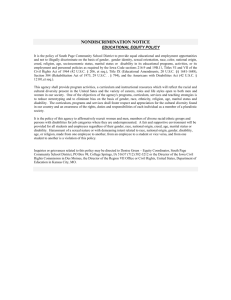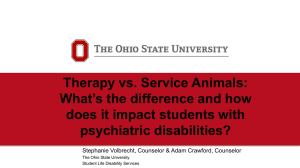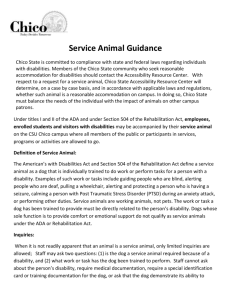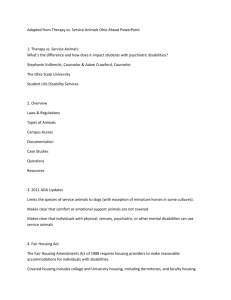Service Animal Guidelines - University of Maine Farmington
advertisement
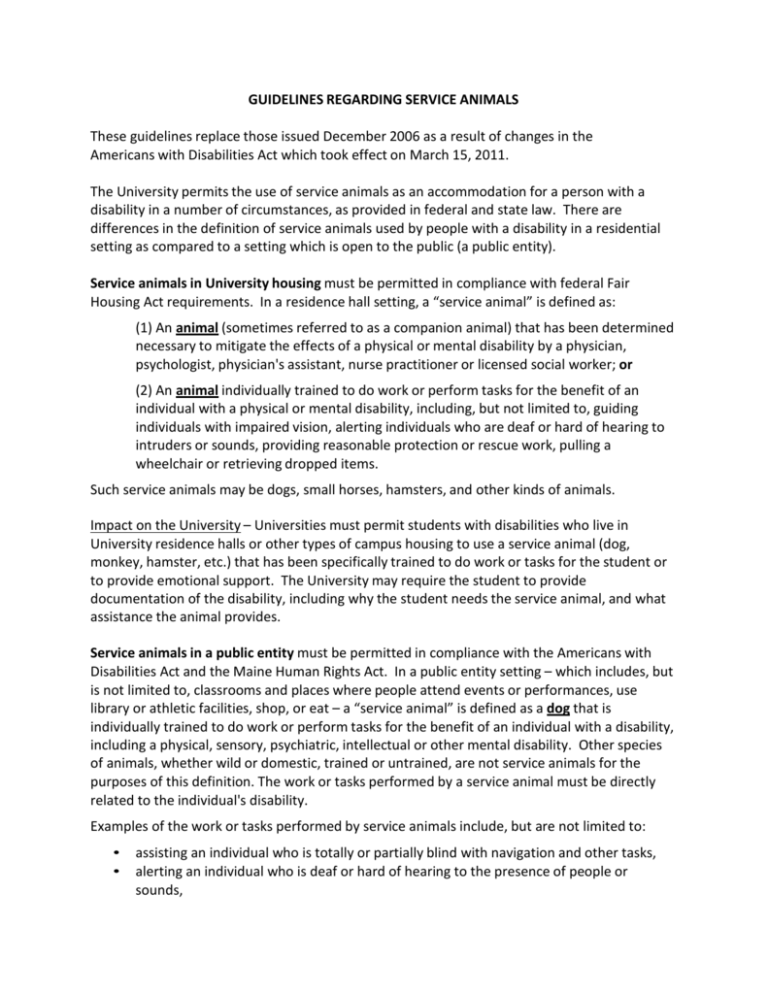
GUIDELINES REGARDING SERVICE ANIMALS These guidelines replace those issued December 2006 as a result of changes in the Americans with Disabilities Act which took effect on March 15, 2011. The University permits the use of service animals as an accommodation for a person with a disability in a number of circumstances, as provided in federal and state law. There are differences in the definition of service animals used by people with a disability in a residential setting as compared to a setting which is open to the public (a public entity). Service animals in University housing must be permitted in compliance with federal Fair Housing Act requirements. In a residence hall setting, a “service animal” is defined as: (1) An animal (sometimes referred to as a companion animal) that has been determined necessary to mitigate the effects of a physical or mental disability by a physician, psychologist, physician's assistant, nurse practitioner or licensed social worker; or (2) An animal individually trained to do work or perform tasks for the benefit of an individual with a physical or mental disability, including, but not limited to, guiding individuals with impaired vision, alerting individuals who are deaf or hard of hearing to intruders or sounds, providing reasonable protection or rescue work, pulling a wheelchair or retrieving dropped items. Such service animals may be dogs, small horses, hamsters, and other kinds of animals. Impact on the University – Universities must permit students with disabilities who live in University residence halls or other types of campus housing to use a service animal (dog, monkey, hamster, etc.) that has been specifically trained to do work or tasks for the student or to provide emotional support. The University may require the student to provide documentation of the disability, including why the student needs the service animal, and what assistance the animal provides. Service animals in a public entity must be permitted in compliance with the Americans with Disabilities Act and the Maine Human Rights Act. In a public entity setting – which includes, but is not limited to, classrooms and places where people attend events or performances, use library or athletic facilities, shop, or eat – a “service animal” is defined as a dog that is individually trained to do work or perform tasks for the benefit of an individual with a disability, including a physical, sensory, psychiatric, intellectual or other mental disability. Other species of animals, whether wild or domestic, trained or untrained, are not service animals for the purposes of this definition. The work or tasks performed by a service animal must be directly related to the individual's disability. Examples of the work or tasks performed by service animals include, but are not limited to: • • assisting an individual who is totally or partially blind with navigation and other tasks, alerting an individual who is deaf or hard of hearing to the presence of people or sounds, • • • • • • • providing nonviolent protection or rescue work, pulling a wheelchair, assisting an individual during a seizure, alerting an individual to the presence of allergens, retrieving items such as medicine or a telephone, providing physical support and assistance with balance and stability to an individual with a mobility disability, and helping a person with a psychiatric or neurological disability by preventing or interrupting impulsive or destructive behaviors. The crime deterrent effects of an animal's presence and the provision of emotional support, well-being, comfort or companionship do not constitute work or tasks for the purposes of this definition. Impact on the University Universities must permit students, employees, and members of the public with disabilities who utilize campus facilities (except housing) to use a service dog that has been specifically trained to do work or tasks for the person. The only questions the University is permitted to ask are, 1) whether the dog is required because of a disability, and 2) what task or work it has been trained to do. Medical documentation may not be requested. Use of animals other than dogs and/or use for emotional support may be denied because the type of animal and the function it performs do not qualify it as a service animal in a public entity. In short, only dogs can be used as service animals by people in a public entity and the dog must be specifically trained to do work or perform tasks for the person with a disability. In contrast, other types of animals in addition to dogs may be used by people with disabilities who live in University housing, and the University must permit the use of animals that have been specifically trained to do work or tasks, that provide comfort or emotional support for the person with a disability. Regardless of setting, a person who has a service animal must keep the animal under control at all times and not permit the animal to interfere with the campus learning, living, or work environment of others. Service dogs in training - Under Maine law, an especially trained service dog trainer, while engaged in the actual training process and activities of service dogs, has the same rights, privileges and responsibilities described in this section with respect to access to and use of public facilities as are applicable to a blind, visually handicapped or otherwise physically or mentally disabled person. Please feel free to consult with the campus or System Equal Opportunity Director and University Counsel in any situation that is unclear. Revised OHR 12/11

